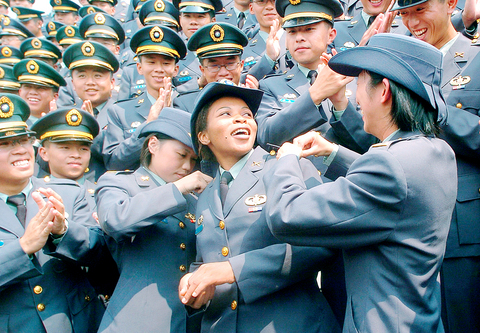A female cadet from Malawi stood out among graduating students in a joint commencement ceremony held for seven military academies in Taipei yesterday.
Mirriam Chinema, an exchange military cadet from the southeastern African country, has become the first foreign female military officer to graduate from the ROC Military Academy since it was founded in 1924 in China.
Chinema said that she has enjoyed history and the military since childhood and that this was the reason why she entered a school for noncommissioned officers in Malawi.

PHOTO: LU CHUN-WEI, TAIPEI TIMES
She said that there was no academy in her country to train military officers and that because of her fascination with Chinese history and culture, she decided to come to Taiwan under a military exchange program between Taiwan and Malawi.
Chinema is scheduled to leave Taiwan for home on Tuesday after completing her four-years of training and study at the ROC Military Academy.
She noted that Taiwan has more rigorous and systematic training than Malawi, noting that Malawi's military training is patterned on the British system, while Taiwan's is based on the US system.
Chinema, who couldn't read or speak Chinese when she first came to Taiwan, can now speak fluent Chinese and Taiwanese. She said that she has had a good time at the academy, enjoying such extracurricular activities as taekwondo.

ALIGNED THINKING: Taiwan and Japan have a mutual interest in trade, culture and engineering, and can work together for stability, Cho Jung-tai said Taiwan and Japan are two like-minded countries willing to work together to form a “safety barrier” in the Indo-Pacific region, Premier Cho Jung-tai (卓榮泰) yesterday said at the opening ceremony of the 35th Taiwan-Japan Modern Engineering and Technology Symposium in Taipei. Taiwan and Japan are close geographically and closer emotionally, he added. Citing the overflowing of a barrier lake in the Mataian River (馬太鞍溪) in September, Cho said the submersible water level sensors given by Japan during the disaster helped Taiwan monitor the lake’s water levels more accurately. Japan also provided a lot of vaccines early in the outbreak of the COVID-19 pandemic,

Kaohsiung Mayor Chen Chi-mai (陳其邁) on Monday announced light shows and themed traffic lights to welcome fans of South Korean pop group Twice to the port city. The group is to play Kaohsiung on Saturday as part of its “This Is For” world tour. It would be the group’s first performance in Taiwan since its debut 10 years ago. The all-female group consists of five South Koreans, three Japanese and Tainan’s Chou Tzu-yu (周子瑜), the first Taiwan-born and raised member of a South Korean girl group. To promote the group’s arrival, the city has been holding a series of events, including a pop-up

TEMPORAL/SPIRITUAL: Beijing’s claim that the next Buddhist leader must come from China is a heavy-handed political maneuver that will fall flat-faced, experts said China’s requirement that the Dalai Lama’s reincarnation to be born in China and approved by Beijing has drawn criticism, with experts at a forum in Taipei yesterday saying that if Beijing were to put forth its own Dalai Lama, the person would not be recognized by the Tibetan Buddhist community. The experts made a remarks at the two-day forum hosted by the Tibet Religious Foundation of His Holiness the Dalai Lama titled: “The Snow Land Forum: Finding Common Ground on Tibet.” China says it has the right to determine the Dalai Lama’s reincarnation, as it claims sovereignty over Tibet since ancient times,

Temperatures in some parts of Taiwan are expected to fall sharply to lows of 15°C later this week as seasonal northeasterly winds strengthen, the Central Weather Administration (CWA) said today. It is to be the strongest cold wave to affect northern Taiwan this autumn, while Chiayi County in the southwest and some parts of central Taiwan are likely to also see lower temperatures due to radiational cooling, which occurs under conditions of clear skies, light winds and dry weather, the CWA said. Across Taiwan, temperatures are to fall gradually this week, dropping to 15°C to 16°C in the early hours of Wednesday